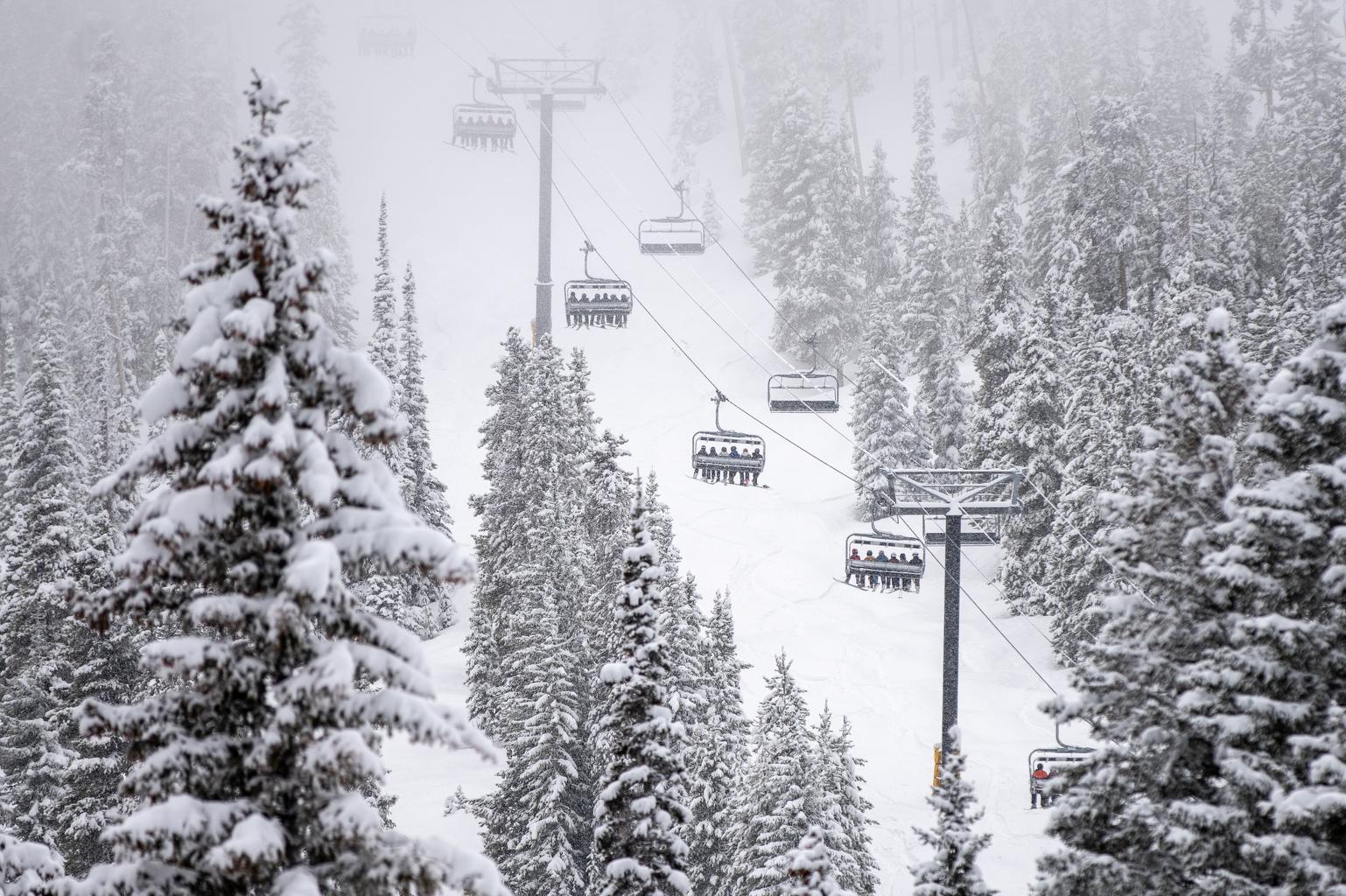For years, a Texas billionaire has wanted to build a sizable resort near to the family-owned Wolf Creek Ski Area. It’s an especially snowy, undeveloped part of Southwest Colorado. Environmentalists and some locals have fought the proposal every step of the way. That may be changing, however, as the Forest Service considers another version. Elise Thatcher is following the story and has this report.
Additional information about the upcoming decision by the Rio Grande National Forest can be found here:
[Photo: Elise Thatcher. Tom Malecek, Divide District Ranger with the Rio Grande National Forest, points to private land owned by Texas businessman Billy Joe "Red" McCombs. The brownish area is a fen wetland, and would become Forest Service land if the agency approves the proposed land exchange.]
[Map: Rio Grande National Forest]
[The following is a transcript of Elise Thatcher's report]
Reporter: Auto magnate Billy Joe Red McCombs has been a part of some high-powered ventures, like co-founding Clear Channel Communications. But the San Antonio billionaire has had a tough time getting the go-ahead for a real estate project in Colorado. Nearly thirty years ago, McCombs made a swap with the Forest Service - some of his private land for nearly three hundred acres right next to the Wolf Creek Ski Area. That’s about twenty miles from the nearest town—like Pagosa Springs. Ever since, McCombs has wanted to build a resort there, named the Village at Wolf Creek. Clint Jones is Project Manager.
Clint Jones: The abundance of snowfall there creates some tremendous powder skiing that is unlike anywhere else I’ve skied. But if you love skiing and you love all types of skiing, Wolf Creek offers all of that.
Reporter: But Red McCombs has run into a lot of roadblocks trying to put in a development. His property is surrounded by public land, so he can’t build until the Rio Grande National Forest approves an access road. The agency did just that some years ago [2006], when McCombs had plans to build enough condos, homes, and hotel rooms for about ten thousand people. That shocked a lot of locals, and environmental groups mounted a successful campaign to stop the road—and the village. Now, McCombs is trying again. This time, he’s asking for another land swap with the Forest Service. Ranger Tom Malecek explained what it could look like.
Tom Malecek: The land exchange pushes that development a little bit further away from the ski area, off of the skiable terrain, and better insulates it from some direct effects of the Village.
Reporter: Malecek is pointing at spruce trees and wetlands that are currently on McCombs’s private land. So far, the agency says the land swap might be a good idea—it could better protect certain wetlands, and the overall impact of the resort could be smaller. For the developer, it would mean access and an opportunity to build, because McCombs would end up getting land next to Highway 160.
Clint Jones: The first phase of the village, calls for at least at present four hundred and ninety seven units, that includes one hotel that I believe is seventy-one units, a few condo buildings and then some single family home sites and town homes.
Reporter : Jones says they wouldn’t build more unless there’s market demand. The development could be as small as less than a dozen homes, and as big as two thousand units—with hotels, condos, town homes, and houses. There’d be commercial space for shops and restaurants, too. So the Forest Service is looking at how all of those options could affect the environment and nearby communities. If the agency decides against the land exchange, it still could let Red McCombs put in a road to get to his private land… and build the resort anyway.
Josh Pollock: This is the wrong thing to do in this place, it is the wrong idea for Wolf Creek Pass and there’s just no way around that.
Reporter: Josh Pollock is Conservation Director of the environmental group Rocky Mountain Wild. The group--earlier, under the name Colorado Wild--played a major role in stopping previous plans for the Village at Wolf Creek. Pollock argues that building well above ten thousand feet could have a major effect on the high alpine plants and animals--like the threatened Canada lynx. Pollock believes the Forest Service’s preliminary environmental review of the exchange--and the development is a good start. But he says it’s missing details on at least one significant natural resource.
Josh Pollock: It’s pretty probable that an adjacent development of the size of the Village of Wolf Creek, would change the local ground water and surface water drainage patterns.
Reporter: And that could have a major impact on special high country wetlands in the area, called fens. But since Red McCombs is open to building a smaller scale resort, some locals have warmed up to it. Howard Fleming is a long-time businessman and resident of South Fork, east of Wolf Creek.
Howard Fleming: Well, when they first started it I was completely against it. But what they were doing was a lot more aggressive, larger development. And now they have reduced it down, moved it back so it’s not going to be as much of an eye sore.
Reporter: Fleming says the resort could mean more business for his tiny town. Most skiers who stay overnight go west, to Pagosa Springs. Mary Jo Coulehan says some business owners there are worried a resort could mean fewer customers. She’s Executive Director of the Pagosa Springs Area Chamber of Commerce.
Mary Jo Coulehan: We have some amenities in Pagosa that the facility up there will never have, such as our natural hot springs. But I think that there is some concerned about losing some beds. Hopefully we won’t lose too much restaurant or retail or things like that.
Reporter: There’s been stiff opposition in Pagosa Springs to the proposed Village at Wolf Creek. Now, like in South Fork, some residents are less worried about a smaller resort. Others like the idea of more jobs for the area. The Forest Service has said the development could generate from thirty to more than two hundred construction jobs--and some number of long term jobs, depending on how big it gets. But not everyone has been won over. The Durango-based San Juan Citizens Alliance has raised questions [week of Oct 8th], about the proposed exchange, saying the public land was appraised to give Red McCombs a better deal. The Forest Service will decide over the coming months whether to allow that land swap or let McCombs build a road. Both could lead to a major resort. Or the agency could turn it all down. The Forest Service is taking comments on the best approach until midnight tonight. A decision is expected early next year... and even if the answer is no to all of the above, McCombs says he’ll be back to find another way to get access—and then build on—his land.







